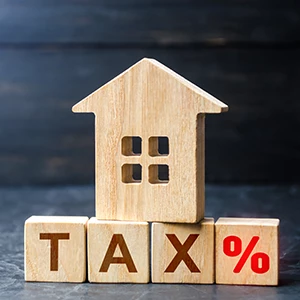When many of these investments were made, full relief was available on any mortgage interest incurred but from April 2017 things changed and this relief has decreased ever since. Mortgage interest relief is now restricted to basic rate (20%) income tax from 2020/21.
the change was implemented over several years:-
Tax year 2017/18 – 75% of mortgage interest was fully allowable and the remaining 25% available at the basic rate;
Tax year 2018/19 – 50% of mortgage interest was fully allowable and the remaining 50% available at the basic rate;
Tax year 2019/20 – 25% of mortgage interest was fully allowable and the remaining 75% available at the basic rate; and
From tax year 2020/21 – mortgage interest deduction is now only given at the basic rate.
This means many property investors will keep less of their income than they did in the past.
Does this apply to you?
If you own rental properties personally rather than through a Limited company and the property is not a ‘furnished holiday let’ or commercial in nature then yes this affects you and your tax bill.
Whether you're a basic rate or higher rate tax payer there's a high chance these rules will impact your overall liability. From tax year 20/21 mortgage interest costs are completely disallowed in computing rental profits and instead a tax credit equal to 20% of the interest will be given against your income tax liability. As the interest cost is completely disallowed, it means you will have higher overall taxable income. This could push you into a higher rate of income tax (40% / 45%), reduce your personal allowance and possibly affect your entitlement to child benefit.
If these changes marginally nudge you into being a higher rate tax payer there may be ways to reduce your taxable income. There are options to carry back pension contributions or Gift Aid donations from the next year. Your accountant should be able to guide you through this if you are a client of Orange Genie Accountancy we will work with you to look at the impact.
What do the numbers look like?
John owns a number of residential buy- to-let properties and has no other income. His annual rental income is £60,000 per annum and he has mortgages on the property which incur annual interest charges of £25,000. John’s tax position based on this income for the five tax years in question is as follows:-
|
|
|
|
|
|
|
|
|
|
|
| 2016/17 | 2017/18 | 2018/19 | 2019/20 | 2020/21 |
|
|
|
| 100% | 75% | 50% | 25% |
|
|
|
|
|
|
|
|
|
|
|
Rental Income |
| 60,000 | 60,000 | 60,000 | 60,000 | 60,000 |
| |
Loan interest |
| (25,000) | (18,750) | (12,500) | (6,250) | 0 |
| |
Net rental income |
| 35,000 | 41,250 | 47,500 | 53,750 | 60,000 |
| |
|
|
|
|
|
|
|
|
|
Less personal allowance | (11,000) | (11,500) | (11,850) | (12,500) | (12,500) |
| ||
|
|
|
|
|
|
|
|
|
|
|
|
|
|
|
|
|
|
Taxable income |
| 24,000 | 29,750 | 35,650 | 41,250 | 47,500 |
| |
|
|
|
|
|
|
|
|
|
|
|
|
|
|
|
|
|
|
Income tax payable |
| 4,800 | 5,950 | 7360 | 9000 | 11500 |
| |
|
|
|
|
|
|
|
|
|
20% credit for interest cost | 0 | (1,250) | (2,500) | (3,750) | (5,000) |
| ||
|
|
|
|
|
|
|
|
|
Total income tax payable | 4,800 | 4,700 | 4,860 | 5,250 | 6,500 |
| ||
|
|
|
|
|
|
|
|
|
Net profit after tax |
| 30,200 | 30,300 | 30,140 | 29,750 | 28,500 |
| |
|
|
|
|
|
|
|
|
|
|
|
|
|
|
|
|
|
|
